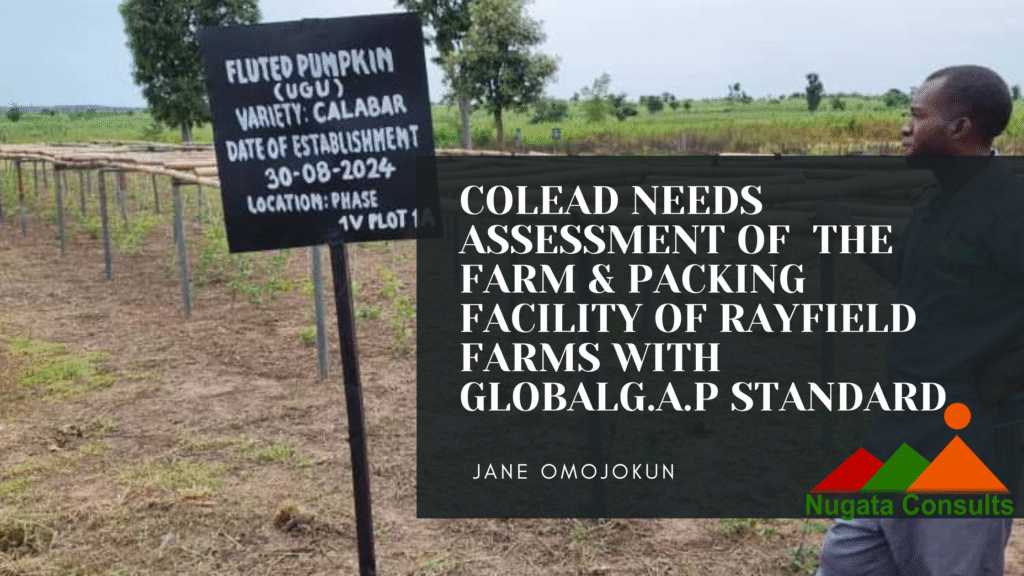COLEAD NEEDS ASSESSMENT OF THE FARM & PACKING FACILITY OF RAYFIELD FARMS USING GLOBALG.A.P.

Nugata Consults Limited recently executed a COLEAD Needs Assessment Project that falls within the FFM+ (Fit-For- Market Plus) programme to strengthen capacities of smallholders, farmer groups and horticultural MSMEs in complying with regulatory and market requirements to secure access to domestic, regional, and international markets aimed to align Rayfield Agricultural and Integrated Farms (RAIF) practices in Nasarawa State, Nigeria with the internationally recognized GLOBALG A.P. standard.
Food safety along the agricultural value chain starts at the farm level and significantly contributes to strengthening food systems. GFSI-recognized schemes such as GLOBALG.A.P. certification are globally recognized for demonstrating to buyers that suppliers are committed to food safety, quality and legality which builds consumer trust and facilitates access to global markets. It is encouraging that smallholders and horticultural MSMEs receive capacity building support from not-for-profit organisations such as COLEAD and other development partners.
RAIF demonstrated the potential to be a major hub in the region for export of fresh farm produce and the capacity to supply some parts of the export market because of a good knowledge of crop management, Good Agricultural Practices (G.A.P.), use of mechanized farming, irrigation practices, biodiversity implementation and use of solar energy which is a highly beneficial agricultural practice, however the export market demands much more than these good farm practices as it requires strict certifications such as GLOBALG.A.P.
Rayfield Farms activities were assessed against the GLOBALG.A.P. Integrated Farm Assurance (IFA) v6 smart standard for fruit and vegetables using the GLOBALG.A.P. IFA v6 Smart P&Cs (Principles and Criteria) checklist. The Integrated Farm Assurance (IFA) for fruit and vegetables is a global standard aimed at responsible farming practices at the primary production level. It is a holistic approach to farm practices involving food safety, environmental sustainability, workers’ well-being, production processes, and traceability. The packing facility under construction was assessed against the GLOBALG.A.P Produce Handling Assurance (PHA) Control Points and Compliance Criteria (CPCC) checklist for appropriateness of the design and building layout in line with global standards, with particular attention to its suitability, ergonomics, adequacy of waste management and process flow, taking into account the principles of HACCP in the construction of the building to ensure that food safety hazards that may lead to product contamination are prevented.
The farm has a dam, several reservoirs, provision of irrigation, solar system for energy supply, and mechanized farming. However, like most MSMEs, there are challenges with adequate knowledge of the national and international regulatory environment and standardization including mandatory and voluntary certifications.
The gaps identified from the needs assessment include inadequate documentation and record keeping e.g. training records, emergency contact persons and phone numbers, risk assessment of workers’ health and safety. Infrastructure gaps include absence of an incinerator and concrete pit for better waste management on the farm, need to reconstruct/repair the collapsed dam and modifications to the packing facility to support process flows (HACCP), flow of people and optimization of space and products. Human resource gaps arising from the competency matrix used to assess the Rayfield Farms workers revealed the need for capacity building because there were varying degrees of gaps in knowledge of GLOBALG.A.P. certification standards, GLOBALG.A.P. IFA P&Cs checklists for internal audit/self-assessment; environmental issues with water, water management & irrigation; energy management; management of supplier & customer relationship; labour rights/compliance with social responsibility principles, data analysis for continuous improvement and corrective actions to address non-conformances.
The action plans and timelines to close the identified gaps include satisfactory implementation of a traceability system on the farm (e.g. documentation of plant propagation materials, farm inputs suppliers list and contact information, raw material suppliers list and contact information, finished product distribution list and contact information etc.) within 1 month, prioritization of the working environment and safety of workers within 3 months, documentation and record keeping within 1year, capacity building and training of staff on the GLOBALG.A.P. IFA v6 Smart P&Cs Checklist to be used for self-assessment audit within 2 years, a scale-up of Rayfield Farms activities to meet GLOBALG.A.P. certification standards within 2 Years to ensure consistent exports to the EU and other global markets
Our recommendation to Rayfield Agricultural and Integrated Farms was to commence the implementation of the action plans, without delay and to address the infrastructure challenges as much as the availability of funds permit to enable the company actualize its potential to be a major hub in the region for export of fresh farm produce. The findings will resonate with most horticultural MSMEs and could serve as a case study to help them work towards GLOBALG.A.P. certification.

